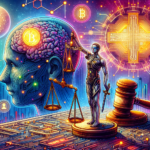Understanding Quantum Mechanics
What is Quantum Mechanics?
Quantum mechanics is a fundamental theory in physics that describes the behavior of matter and energy on a very small scale, typically at the level of atoms and subatomic particles. Unlike classical mechanics, which deals with larger entities, quantum mechanics introduces concepts such as superposition, entanglement, and quantization.
Key Principles of Quantum Mechanics
One of the critical ideas in quantum mechanics is that particles can exist in several states at once until measured. This is known as superposition. Entanglement refers to the phenomenon where particles become interconnected and the state of one can instantly influence another, regardless of distance. Furthermore, quantization means that certain properties can only take on discrete values rather than a continuous range.
Overview of Blockchain Technology
What is Blockchain?
Blockchain is a decentralized digital ledger technology that records transactions across many computers. It is designed to be secure, transparent, and tamper-resistant. Transactions are grouped into blocks, and each block is linked to the previous one, forming a chain.
How Blockchain Works
In a blockchain network, when a transaction occurs, it is validated by participants known as nodes. Once validated, it is added to a pool of transactions waiting to be included in the next block. Miners or validators then compete to solve complex mathematical problems to create new blocks and maintain the integrity of the network.
Challenges Facing Current Blockchain Protocols
Scalability Issues
One significant challenge for blockchain technology is scalability. As the number of users and transactions increases, so does the demand for computational power and storage. This can lead to slower transaction speeds and higher costs, especially in public blockchain networks like Bitcoin.
Security Vulnerabilities
While blockchain is generally considered secure, vulnerabilities still exist. With the rise of quantum computing, traditional cryptographic methods currently used in blockchain protocols may soon be exposed to new types of attacks, potentially compromising the integrity of the data.
Energy Consumption
Many blockchain protocols, particularly those using proof-of-work, consume a considerable amount of energy. This raises concerns about environmental impact and sustainability, prompting the need for more energy-efficient alternatives.
Potential Influences of Quantum Mechanics on Blockchain
Quantum Computing Basics
Quantum computing harnesses the principles of quantum mechanics to process information in fundamentally different ways from classical computers. Unlike traditional bits that represent either 0 or 1, quantum bits or qubits can represent both simultaneously due to superposition. This characteristic allows quantum computers to perform complex computations at speeds that are unachievable by classical methods.
Enhancing Blockchain Security with Quantum Cryptography
One of the most promising intersections between quantum mechanics and blockchain lies in the field of quantum cryptography. This method leverages the properties of quantum states to create secure communication channels. For instance, quantum key distribution can provide a way to share encryption keys that are immune to eavesdropping, ensuring that any attempt to intercept the key will be detected.
Example: Quantum Key Distribution (QKD)
QKD involves sending qubits using photons. If someone tries to intercept these qubits, the act of measuring them will disturb their state, alerting the parties involved. By integrating QKD into blockchain protocols, it can significantly enhance data security, making it more resistant to quantum attacks.
Improving Scalability through Quantum Algorithms
Another area where quantum mechanics could positively impact blockchain is through the development of quantum algorithms tailored for blockchain transactions. Quantum computing can potentially manage complex calculations—such as transaction validation—much more efficiently than classical computing.
Example: Grover’s Algorithm
Grover’s algorithm could be employed to enhance searching through blockchain records. It offers a quadratic speedup for unstructured search problems, meaning that a process that typically takes N steps could be completed in approximately square root of N steps. This could lead to significantly faster transaction processing times and enhance the overall throughput of blockchain networks.
Reducing Energy Consumption with Quantum Technologies
As energy consumption becomes a growing concern, quantum computing could present more energy-efficient alternatives for validating blockchain transactions. Quantum computers often require lower energy resources for calculations due to their parallel processing capabilities, which could replace energy-hungry proof-of-work systems.
Potential Quantum Protocols
Emerging quantum protocols, such as quantum consensus algorithms, might offer an alternative way to achieve consensus without the energy costs of traditional methods. By utilizing quantum mechanics, these algorithms could validate transactions and secure the network more efficiently.
Challenges of Integrating Quantum Mechanics with Blockchain
The Current State of Quantum Computing
While quantum computing shows significant promise, it is still in its infancy. As of now, practical, large-scale quantum computers that are capable of outperforming classical computers on relevant tasks are not yet available. This presents a challenge, as blockchain development must consider the timeline for quantum advancements.
Compatibility Issues
Implementing quantum technologies into existing blockchain protocols may require significant overhauls. Current systems could necessitate new architectures, consensus mechanisms, and cryptographic approaches to effectively blend quantum mechanics with blockchain.
Interoperability Concerns
Different blockchain networks may have varying levels of compatibility with quantum technologies. Finding solutions that facilitate seamless interactions among these diverse platforms while maintaining security and integrity will be an essential challenge.
Regulatory and Ethical Considerations
The rise of quantum technologies brings regulatory and ethical implications as well. Governments and organizations will need to create frameworks that ensure responsible use of these technologies in blockchain, particularly regarding data privacy and security.
The Future of Blockchain and Quantum Mechanics
Possibilities for New Innovations
As researchers continue to explore the combination of quantum mechanics and blockchain technology, a world of new innovations and applications may emerge. From banking to supply chain management and identity verification, the integration could lead to revolutionary changes in various industries.
Building Trust in Decentralized Systems
By enhancing security and efficiency, quantum-assisted blockchain technologies could foster greater levels of trust in decentralized systems. Users may feel more confident in secure transactional practices, which could lead to broader adoption.
The Collaboration Between Financial and Tech Industries
Finally, collaboration between quantum technology firms and blockchain developers may accelerate this transformation. By pooling expertise from both fields, more robust and innovative solutions can emerge, paving the way for a future where both technologies work harmoniously together.









